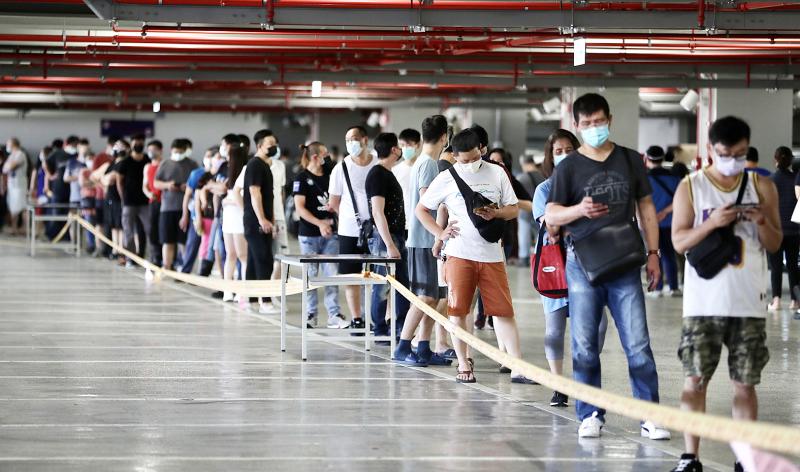Democratic Progressive Party Taipei City Councilor Wu Pei-yi (吳沛憶) yesterday criticized the city government after a market vendor tested positive for COVID-19 after receiving a jab against the virus, forcing 73 people at the vaccination site into isolation.
Responding to an outbreak linked to Taipei Agricultural Products Marketing Co markets, the city set up rapid testing stations and announced plans to vaccinate everyone associated with the company’s wholesale markets.
Priority was given to those who tested negative through rapid screening.

Photo: CNA
Taipei Market Administration Office Director Chen Ting-hui (陳庭輝) said that the city on June 9, 11 and 18 sent a team to Huannan Market (環南市場) in Wanhua District (萬華) to test all personnel.
However, the vendor did not undergo mandatory testing before getting vaccinated, despite repeated notifications, Chen said.
Only later did they go to a rapid testing station in New Taipei City’s Banciao District (板橋), where they tested positive, Chen said.
To get the vaccine, the vendor rode in a charter bus and waited in line with other people, Chen said, adding that health officials have traced 73 contacts.
The other vendors are angry that they have been listed as contacts and ordered to isolate because they obeyed orders to get inoculated, Wu said, adding that one vendor estimated that the case must have encountered 200 to 300 people during the process.
The charter bus driver did not keep track of the passengers and everyone had to wait for at least half an hour, she said, adding: “Why were those people not listed as contacts?”
Poor planning by the Taipei City Government has exposed people to danger when they were simply following instructions, Wu said.
The city must more carefully consider all supporting measures beforehand, or it might create even more problems, she said.
In an article on Voicettank, Taiwan Thinktank’s opinion Web site, Phil Smith, a former general manager of Reuters News North Asia who lives in New Taipei City, also criticized Taipei officials, writing that they had allowed partisan politics to interfere with the city’s pandemic response.
The Chinese-language article published on June 18 titled: “Are Taiwan’s opposition camps the men in a pub talking politics,” criticized the “breathtaking arrogance” of Taipei Deputy Mayor Vivian Huang (黃珊珊), who on Facebook said that she had refused calls from Minister of Health and Welfare Chen Shih-chung (陳時中).
“This amounts to dereliction of duty and shows gross disregard for the people of Taipei, who she is supposed to protect and serve,” Smith wrote.
Taipei Mayor Ko Wen-je (柯文哲) blames the city’s failures on the central government while crediting other cities’ relative success to “insider trading,” he wrote.
Taipei City Government spokeswoman Chen Chih-han (陳智菡) said that the city has made many concrete suggestions that have not always been adopted.
For example, Taipei was the first to set up quarantine hotels and specialized taxis, she said.
It also voiced concern to the Executive Yuan when the Central Epidemic Command Center in August last year allowed people entering the country to quarantine at regular hotels, she said.
Ko also suggested that flight personnel be subject to the same quarantine rules as ordinary travelers and be prioritized for vaccines, Chen Chih-han said.

The manufacture of the remaining 28 M1A2T Abrams tanks Taiwan purchased from the US has recently been completed, and they are expected to be delivered within the next one to two months, a source said yesterday. The Ministry of National Defense is arranging cargo ships to transport the tanks to Taiwan as soon as possible, said the source, who is familiar with the matter. The estimated arrival time ranges from late this month to early next month, the source said. The 28 Abrams tanks make up the third and final batch of a total of 108 tanks, valued at about NT$40.5 billion

Travel agencies in Taiwan are working to secure alternative flights for travelers bound for New Zealand for the Lunar New Year holiday, as Air New Zealand workers are set to strike next week. The airline said that it has confirmed that the planned industrial action by its international wide-body cabin crew would go ahead on Thursday and Friday next week. While the Auckland-based carrier pledged to take reasonable measures to mitigate the impact of the workers’ strike, an Air New Zealand flight arriving at Taipei from Auckland on Thursday and another flight departing from Taipei for Auckland on Saturday would have to

A group from the Taiwanese Designers in Australia association yesterday represented Taiwan at the Midsumma Pride March in Melbourne. The march, held in the St. Kilda suburb, is the city’s largest LGBTQIA+ parade and the flagship event of the annual Midsumma Festival. It attracted more than 45,000 spectators who supported the 400 groups and 10,000 marchers that participated this year, the association said. Taiwanese Designers said they organized a team to march for Taiwan this year, joining politicians, government agencies, professionals and community organizations in showing support for LGBTQIA+ people and diverse communities. As the first country in Asia to legalize same-sex

MOTIVES QUESTIONED The PLA considers Xi’s policies toward Taiwan to be driven by personal considerations rather than military assessment, the Epoch Times reports Chinese President Xi Jinping’s (習近平) latest purge of the Chinese People’s Liberation Army (PLA) leadership might have been prompted by the military’s opposition to plans of invading Taiwan, the Epoch Times said. The Chinese military opposes waging war against Taiwan by a large consensus, putting it at odds with Xi’s vision, the Falun Gong-affiliated daily said in a report on Thursday, citing anonymous sources with insight into the PLA’s inner workings. The opposition is not the opinion of a few generals, but a widely shared view among the PLA cadre, the Epoch Times cited them as saying. “Chinese forces know full well that